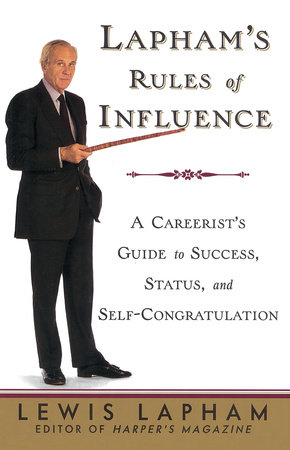Lapham's Rules of Influence
A Careerist's Guide to Success, Status, and Self-Congratulation
Lewis Lapham
Paperback
May 18, 1999 | ISBN 9780812992342
AmazonBarnes & NobleBooks A MillionBookshop.orgHudson BooksellersPowell'sTargetWalmart
About the Book
Drawing upon a lifetime of experience among the cogno-scenti, Mr. Lapham breaks rank and reveals the unspoken secrets of getting ahead: what to say, how to dress, when to lie, whom to befriend, where to be seen, and why it is absolutely essential to wear clean shoes. ("The first impression is also the last impression. You don't wish to be remembered as the stain on the rug.")
Anyone interested in self-advancement will be transformed by Lapham's Rules of Influence, which offers proven nuggets of wisdom. For example, when trying to impress the boss, remember: "Flattery cannot be too often or too recklessly applied. Think of it as suntan lotion or moisturizing cream."
Written with stinging wit and tongue planted firmly in cheek, Lapham's Rules of Influence is a brilliant critique of class and manners in America, packed with the kind of irreverent observation that only Lewis Lapham can provide.
Seek out the acquaintance of people richer and more important than yourself, and never take an interest in people who cannot do you any favors.
Rumor tinged with malice is the most precious form of gossip. When you are invited to spend a weekend with important journalists or movie stars, it is considered polite to bring four items of unpublished slander in lieu of a house present or a bottle of wine.
Make unsparing use of clichés. The empty word is the correct word. Contrary to the opinion of snobbish New York intellectuals, the placid murmur of cliché is always preferable to the expression of strong feeling, which is an embarrassment.
A truly fashionable dinner party ends at the moment when all the guests have arrived and everybody has been seen or not seen. Once attendance has been taken, the rest of the evening is superfluous.
A good meeting is one at which nothing happens. Sit erect, second all the motions, remember everybody's name.




